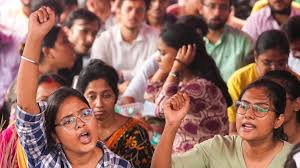Under the auspices of the West Bengal Junior Doctors’ Federation (WBJDF), junior physicians in Kolkata are participating in a continuous protest campaign in which they are calling for enhancements to hospital security and infrastructure as well as an end to the “threat culture” that they allege permeates the medical field. Their main concerns are the need for improved working conditions and the safety of doctors, especially in emergency situations.
The doctors have not yet returned to work despite numerous discussions—including a five-hour meeting on Tuesday night. Without a formal, written promise from the state government to meet their demands, many physicians are reluctant to return to their jobs. These requests include having a real-time monitoring system for hospital bed availability, strengthening patient referral protocols, and boosting hospital security. In order to enhance doctor-patient connections, they are also requesting the hiring of permanent healthcare employees, the removal of non-medical personnel from administrative positions, and the provision of professional counseling services. They also want elections for student unions, resident doctor associations in every college, Internal Complaints Committees (ICC) established in every hospital, and a general dismantling of the “threat culture.”
The WBJDF asked West Bengal Chief Secretary Manoj Pant to meet with them on Wednesday to talk about forming a special task group to deal with their concerns. Pant consented to the 6:15 p.m. meeting at Nabanna; nevertheless, the physicians showed up an hour later than scheduled because of other commitments. Pant added another level of complexity to the problem by telling them that the state administration was also handling the present flood disaster in Bengal.
The number of demonstrators decreased as the doctors left for the meeting; many went back to their campuses frustrated that the decision to partially remove the cease-work had not been made. After more than 40 days of the protest, many doctors are starting to question if their strategy is sustainable. Some wanted emergency services to be resumed immediately, while others insisted on waiting for a formal state government consent before acting. As long as both parties continue to deliberate, the matter will not be addressed.
SOURCE :
TIMES OF INDIA








